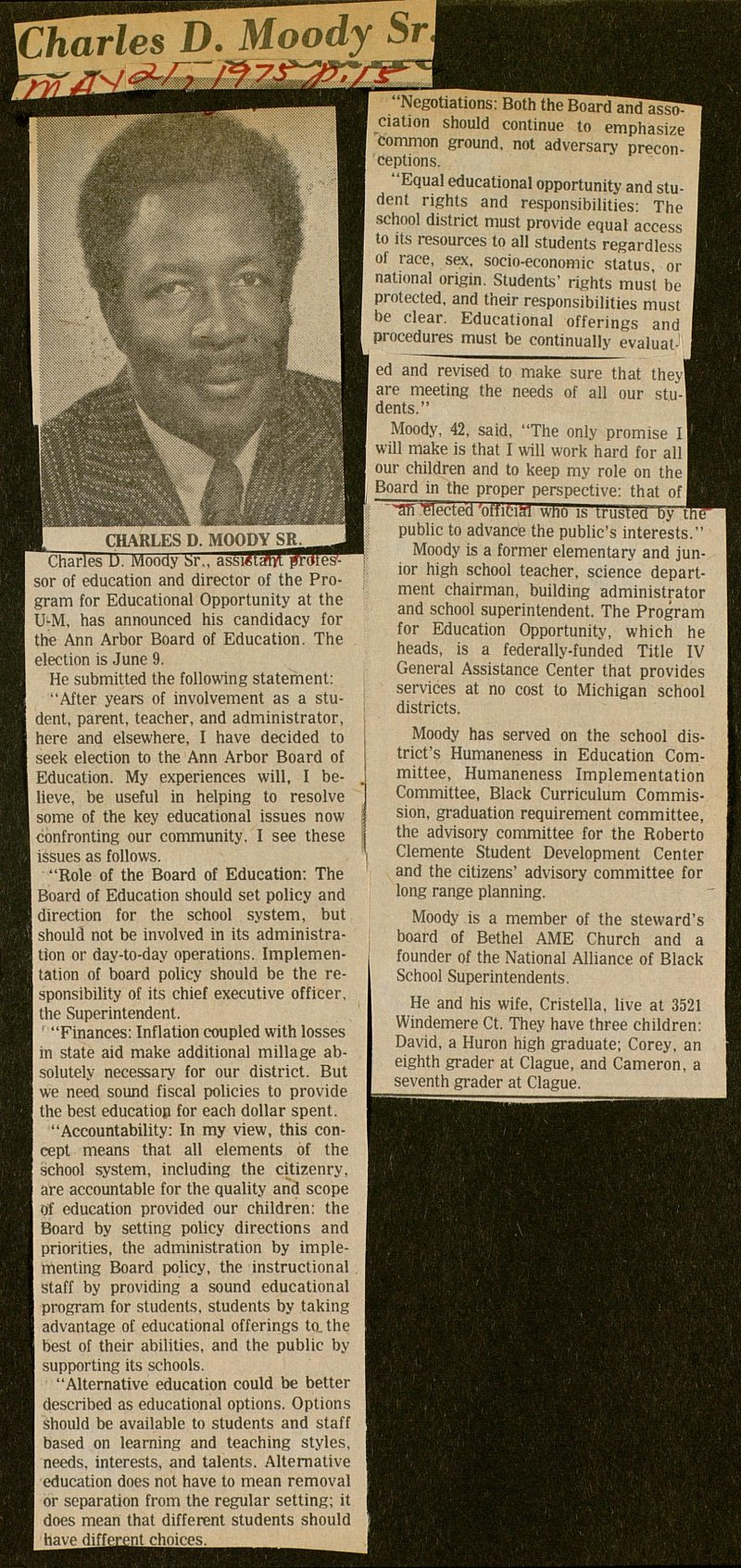Charles D. Moody Sr.

Charles D. Moody 5r., assiítaiyt protes'sor of education and director of the i gram for Educational Opportunity at the U'M, has announced his candidacy for the Ann Arbor Board of Education. The election is June 9. He submitted the following statement: "Af ter years of involvement as a student, parent, teacher, and administrator, here and elsewhere, I have decided to seek election to the Ann Arbor Board of Education. My experiences will, I . lieve, be useful in helping to resolve some of the key educational issues now cónfronting our community. I see these I issues as follows. "Role of the Board of Education: The I Board of Education should set policy and I direction for the school system, but I should not be involved in its administraI tion or day-to-day operations. ImplemenI tation of board policy should be the reI sponsibility of its chief executive officer, I the Superintendent. ' "Finances: Inflation coupled with losses I in state aid make additional millage abI solutely necessary for our district. But I we need sound fiscal policies to provide I the best education for each dollar spent. "Accountability: In my view, this I I cept means that all elements of the I school system, including the citizenry, I are accountable for the quality and scope I of education provided our children: the j I Board by setting policy directions and I I priorities, the administration by impleI menting Board policy, the instructional I I staff by providing a sound educational I program for students, students by taking I advantage of educational offerings to. the I I best of their abilities, and the public by I I supporting its schools. "Alternative education could be better I described as educational options. Options I I should be available to students and staff I based on learning and teaching styles, I needs, interests, and talents. Alternative I I education does not have to mean removal I or separation from the regular setting; it I I does mean that different students should have differenUjhoices I I "Negotiations: Both the BoanHñTS? I ciation should continue to emphasize I Common ground, not adversary preconI ceptions. "Equal educational opportunity and stuI dent rights and responsibilities: The I school district must provide equal access I to its resources to all students regardless of race, sex, socio-economic status, or national origin. Students' rights must be protected, and their responsibilities must be clear. Educational offerings and I procedures must be continually evaluat ■' I ed and revised to make sure that theyl I are meeting the needs of all our st.u-l I dents." I Moody, 42, said, "The only promise il I wül make is that I will work hard for all I I our children and to keep my role on the I I Board in the proper perspective: that of I i TTCelected 'orlifciïi who is trusted by tn public to advance the public's interests. ' ' Moody is a former elementary and junior high school teacher, science department chairman, building administrator and school superintendent. The Program for Education Opportunity, which he heads, is a federally-funded Title IV General Assistance Center that provides services at no cost to Michigan school districts. Moody has served on the school district's Humaneness in Education Committee, Humaneness Implementation Committee, Black Curriculum Commission, graduation requirement committee, I the advisory committee for the Roberto Clemente Student Development Center and the citizens' advisory committee for long range planning. - I Moody is a member of the steward's board of Bethel AME Church and a founder of the National Alliance of Black School Superintendents. He and his wife, Cristella, live at 3521 Windemere Ct. They have three children: I David, a Hurón high gradúate; Corey, an eighth grader at Clague, and Cameron, a I seventh grader at Clague.
Article
Subjects
Education Elections
Has Photo
Ann Arbor News
Old News
Cristella Moody
Charles D. Moody Sr